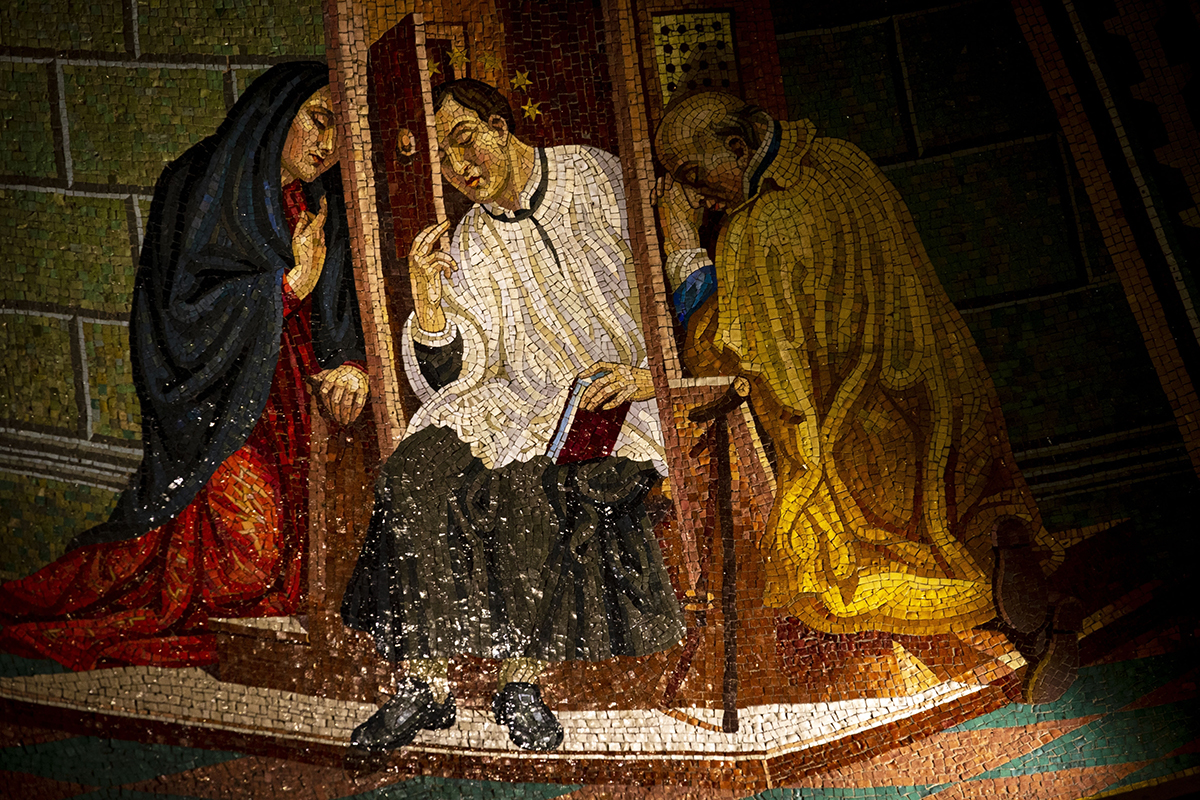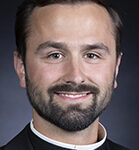Speak the truth courageously

Sharing burdens with trusted spiritual guides brings relief and freedom
This is the fifth in a series of six articles exploring the art of spiritual discernment
according to St. Ignatius of Loyola. Read previous parts below:

One of the great scenes of cinematic history is in “Star Wars Episode V: The Empire Strikes Back.” At the movie’s end, Darth Vader cuts off Luke Skywalker’s arm in a dramatic lightsaber battle. Wounded and backed into a corner, Luke was next dealt an even more powerful blow. The evil Sith lord reveals a dark truth to Luke: “I am your father.”
Mere words cause Luke to scream in greater agony than when he lost a limb. Why? Because discovering the truth that he is the son of such an evil man is powerful.
Even more powerful is speaking the truth out loud. This is part of what inspires St. Ignatius’s 13th rule in the Rules for Discernment of Spirits. While Darth Vader speaks truth to inflict great pain, St. Ignatius advises that in other contexts, we can speak truth to experience great relief and freedom.
St. Ignatius uses the striking example of a romantic affair. A person engaging in an affair does everything he or she can to keep it hidden. The adulterer plots so that his temptations and seductions “be received secretly and kept secret.” If they are, then they will grow and sink in. If the affair comes to light, the whole thing is turned on its head. No longer is the temptation exciting and adventuresome. It gets seen for what it is: ugly and destructive. The enemy (Ignatius’s term for any bad spirit) is exactly like the adulterer. He plots to get us to keep our sins secret. He does so by pouring on shame and fear.
The antidote, then, is to speak the truth courageously. Ignatius’s insight in rule 13 is that when temptation or sin afflicts us, we must bring it to the light. Speaking our sins out loud puts them in their place; they lose their power to terrify and entrap us. This is one of the reasons we go to confession. The book of James even commands this: “Therefore, confess your sins to one another… that you may be healed” (James 5:16).
Is there a burden you have been carrying alone in your life for months, years or even decades? That is what Ignatius wants you to get out. Not just to anyone, but to a trusted spiritual guide. Find a priest whom you know and respect. Talk to a friend whom you admire for their relationship with Christ. There is perhaps no greater joy in life than speaking out loud about what you feel makes you a monster and being met with compassion, mercy and encouragement.
Part 4: Remain steadfast in prayer even when on a spiritual roller coaster
Consider the following contrasting experiences.
One day, everything is fine. Prayer comes with ease, and I am kindly disposed toward God. The next day, I only want to avoid prayer and have no interest in spiritual things. Sound familiar? Our walk with God can often be something of a spiritual roller coaster. What are we to make of this?
In rules three and four of the “Rules for Discernment of Spirits,” St. Ignatius provides guidance for these experiences, which he calls “spiritual consolation” and “spiritual desolation.” The experience of spiritual consolation is marked by “every increase in faith, hope and love.” It brings “interior joy that invites and attracts to what is heavenly and to the salvation of one’s soul by filling it with peace and quiet in its Creator and Lord.” This, of course, is the peak of the roller coaster. Yet, in no time, it can dip into a valley. Spiritual desolation is marked by “darkness of soul, turmoil of spirit, inclination to what is low and earthly, restlessness rising from many disturbances and temptations which lead to want of faith, want of hope, want of love.” A person in desolation is often “slothful, tepid and sad.”
It is important to know that St. Ignatius understands both spiritual consolation and spiritual desolation to be natural and normal in our life with God. No one will exist in constant spiritual consolation on this side of eternity. The brokenness that entered the world after the fall of Adam and Eve prevents us from living in perfect friendship with God. However, in rule nine, Ignatius explains that God permits desolation so that we might learn to trust Him and love Him — not for the good gifts that He gives us but because of who He is.
Living in spiritual desolation is one of the darkest times of our spiritual journey, and yet, we can grow tremendously in such a time. Faith is refined in spiritual desolation, and we learn to love with a pure heart. When we find ourselves in a time of desolation, our North Star is rule five: When in desolation, never make a change. Stick with the prayer commitments you made before the desolation invaded. Remain firmly committed to them, especially to ones that relate to your vocation. “For just as in consolation the good spirit guides and counsels us, so in desolation the evil spirit guides and counsels.” When in desolation, don’t freak out. Wait as patiently and calmly as you can, trusting that the desolation is never as dark as it presents itself. It will lift, and when it does, God will draw you even closer into His embrace than ever before.
Part 3: Discernment of spirits
We must learn how these different aspects of the spiritual plane work in our lives in order to engage with them appropriately
Our spiritual journey is like driving across Interstate 70 to Denver. When you first glimpse the silhouette of the Rockies, it is impossible not to be taken by their grandeur and majesty. They seem to be a monolithic edifice of glory. And yet, as you drive up the foothills and into those mountains, you begin to realize they are not quite as straightforward as they first appeared. Their beauty is much more intricate and adventurous than you could have guessed. Those mountains are filled with flowery valleys and jagged ridgelines, rocky scrambles and pristine lakes.
When we are first awakened to what a life with God can really be, it appears much like those Rocky Mountains do from a distance — simple and glorious. As we enter more deeply into the spiritual world, however, its complex beauty reveals itself more fully. St. Ignatius experienced this himself and gained wisdom for navigating the spiritual world. He passed on some of this wisdom in the form of the “Rules for Discernment of Spirits,” found in the Spiritual Exercises.
The preface to the rules reveals a fundamental insight: There are good spirits, which are to be trusted and accepted, and there are bad spirits, which are to be rejected. Spirituality itself is neither good nor bad. Rather, within the spiritual plane of existence, just as in the material one, there is some good and some bad. Therefore, we must learn how these different spirits work in our lives in order to engage with them appropriately.
In the first two rules, Ignatius explains that good spirits and bad spirits act in contrasting ways. In a person who is far from God, a bad spirit will move in a person’s soul in a soothing way, making it easy for them to continue down that path. A good spirit will try to put up obstacles to continuing in that lifestyle, perhaps by stinging the conscience. When a person desires to grow closer to God, the action of the good and bad spirits will flip. In this person, it is now the bad spirit that will raise obstacles of anxiety, sadness and disquiet. The good spirit will do everything he can to keep us on the path of goodness. This is why Ignatius says at this stage, “It is characteristic of the good spirit … to give courage and strength, consolations, tears, inspirations and peace.”
These simple insights can be immediately illuminating for those living with spiritual awareness. Take a moment and reflect on where you are in your walk with God. Whether you are in the plains of Kansas or on the summit of a Colorado fourteener, consider if Ignatius’s insights ring true. Are there any spirits working on you right now that you need to accept or reject?
Part 2: Asking for God’s grace is key to growing in spiritual awareness
Have you ever heard of someone running a red light without even realizing it? It seems crazy, but perhaps it has even happened to you on a chaotic day while your thoughts were elsewhere. Clearly, it’s dangerous to be unaware of your surroundings like that! This is just as true for our spiritual lives as it is for our physical lives. Awareness of the thoughts, feelings and desires of our lives not only protects us from giving into unwieldy temptations and unhelpful discouragement, but it also enables us to discern God’s presence more fully. Unfortunately, there are all kinds of pitfalls in the quest to maintain spiritual awareness.
Perhaps the most common threat to our spiritual awareness is simply the daily grind. “I just don’t have time or energy to pray!” This sentiment is expressed almost everywhere, regardless of age, occupation or vocation. And frankly, the most important responsibilities — the ones we cannot let slide — are often the ones that demand everything we have to offer.
A great example of this is being a working parent. Raising children is a 24/7 vocation, which requires not just time, but emotional and mental energy. For parents, or for anyone who is deeply committed to any such responsibility, these demands are no small obstacle to remaining interiorly available to God’s action. Let’s face it, it’s a whole lot easier to get to the end of an exhausting day and sit down to watch Netflix than it is to review where you’ve been spiritually. Oftentimes this difficulty flows from the fear that being attentive to God will leave us bored or unsatisfied.
The truth is He will always keep us fascinated and fulfilled when we learn to walk with Him in a stable way. Learning to live this way is not something we can attain. Jesus says so: “Apart from me you can do nothing” (John 15:5). This is good news, because this means the most important thing we can do to grow our spiritual awareness is also very simple: Ask for that grace. This is how St. Ignatius begins every prayer period in the Spiritual Exercises. It can be very short, such as, “Jesus, give me the grace to be more aware of Your presence.” Put it on your mirror and read it every day. Make it a mantra you repeat throughout your day, as you type at the computer or while you change a diaper.
The beauty of this prayer is that it accomplishes two things. First, your request moves the Heart of Jesus to give the grace! If you persevere in asking from the heart, He cannot help but grant it. Second, regularly asking for the grace trains your own heart to desire it more. This is especially important because maintaining spiritual awareness is, at the end of the day, not a question of time or energy but of what your heart really wants.
Part 1: Cultivating a life of peace and joy in Christ
The art of spiritual discernment involves knowing where we are spiritually so we might know God’s plan and the peace that comes from Him
Imagine a life where you clearly know God’s plan for you at every moment, in the concrete events of your life, day in and day out. What would it be like? Even the most basic stresses would be lifted. Car isn’t starting in the morning? Well that was because otherwise you would have been in that accident outside your neighborhood. Got sick at the worst possible time? When you freely offered that suffering, God used it to strengthen a family member. Can’t stop gossiping about that annoying coworker no matter how hard you try? God permits that nagging imperfection to foster trust and humility in you.
Such a life would be marked by the “peace of God that surpasses all understanding” (Philippians 4:7), wouldn’t it? This kind of life, in faith, is possible, when we grow in the habit of discernment. Now discernment” is, even for many Catholics, a somewhat nebulous word, and when it is known it is pretty well exclusively used to speak of vocational discernment. That is, asking God what His “big picture” plan is for one’s life. Priest? Religious sister? Marriage? Real discernment of a vocation, however, can only be done when we know the broader art of discernment in general. What is more, discernment is just as necessary after entering a stable vocation as it is in choosing one. So if it is so important, what is it?
St. Ignatius of Loyola can help us here. He became an expert in discernment after his life was dramatically changed by a battlefield wound. In his recovery he experienced a profound encounter with God. This opened his spiritual eyes to a new awareness of God’s presence in his life. From this he was moved to compose the “Spiritual Exercises,” a book designed to be a guide to an intense retreat practiced over the course of 30 days. However, the Exercises contains nuggets of practical wisdom for discernment that can be applied in anyone’s daily life.
Discernment, as St. Ignatius proposes, is a process of becoming aware of the spiritual plane of our lives, understanding what is going on there, and choosing to receive good inspirations and reject the bad. The crucial starting point in this process is awareness. St. Ignatius would ask you, how aware are you of the spiritual world? The thoughts, feelings and desires of your life: do you notice them as they pass through your heart and mind, or are you so caught up in a hurried life that they pass you by? Becoming more aware of these movements is the first step in cultivating a life of peace and joy in Christ. Only when we know where we really are spiritually can we know God’s plan for us, and experience the peace of His presence no matter the circumstances.





